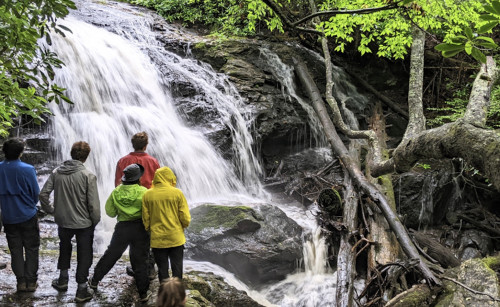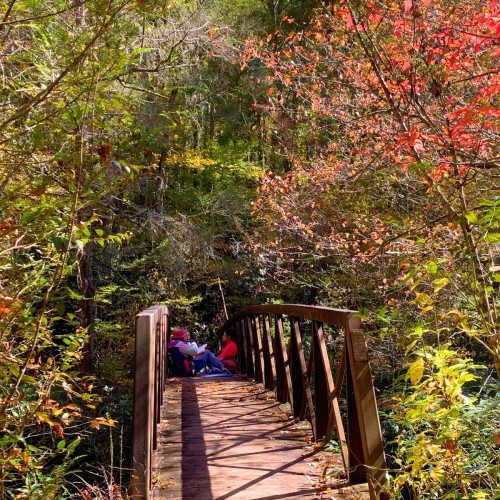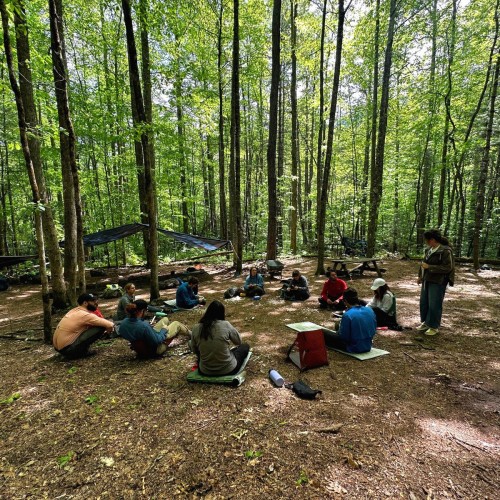






Blue Ridge Therapeutic Wilderness
Treatment Focus
This center treats substance use disorders and mental health conditions. You'll receive individualized care catered to your unique situation and diagnosis, learn practical skills for recovery, and make new connections in a restorative environment.
Primary Level of Care
Offering intensive care with 24/7 monitoring, residential treatment is typically 30 days and can cover multiple levels of care. Length can range from 14 to 90 days typically.
Claimed
Recovery.com has connected directly with this treatment provider to validate the information in their profile.
Treatment Focus
This center treats substance use disorders and mental health conditions. You'll receive individualized care catered to your unique situation and diagnosis, learn practical skills for recovery, and make new connections in a restorative environment.
Primary Level of Care
Offering intensive care with 24/7 monitoring, residential treatment is typically 30 days and can cover multiple levels of care. Length can range from 14 to 90 days typically.
Private Pay
You pay directly for treatment out of pocket. This approach can offer enhanced privacy and flexibility, without involving insurance. Exact costs vary based on program and length of stay. Contact the center for specific details.
Blue Ridge Therapeutic Wilderness
Blue Ridge Therapeutic Wilderness
About Blue Ridge Therapeutic Wilderness
Nestled in the rolling Blue Ridge Mountains, Blue Ridge Therapeutic Wilderness is the “leading full-immersion wilderness therapy program” for teens and young adults. Founded in 2002, this facility is staffed with primary therapists, family therapists, field instructors, a clinical psychologist, psychiatrist, and doctorate level leadership roles. They are licensed by the Department of Human Services in Georgia and accredited by the Association for Experiential Education.
Adolescents
The adolescent program at Blue Ridge Therapeutic Wilderness is tailored to ages 13-18 who are looking to take transformative action for mental health struggles such as depression, anxiety, screen addictions, academic issues, ADD & ADHD, family conflict, self harm, and substance abuse, to name a few. Each patient receives a tailored treatment plan to their specific challenges through collaboration with a Licensed Primary Therapist and the 24/7 on-site staff. Within the first two weeks of the students arrival, a licensed clinical psychologist conducts an initial assessment which further helps create an individualized treatment plan for each patient.
Young Adults
The young adult program at Blue Ridge Therapeutic Wilderness, “Emerald Arrow”, is available to ages 18-28. Whether you are struggling with mental health challenges, family system conflict, or identity issues, Emerald Arrow provides personalized care that tailors to these needs. Within the first two weeks of arrival, a clinical psychologist conducts an assessment, which the primary therapies and field instructors use to provide weekly individualized sessions.
Daily Life
Located in a distraction free environment of the wilderness, the day-to-day experience is extremely unique. Daily routines are cultivated through individual therapy sessions, teamwork activities, personal time, motivational interviewing, and academics. Adolescents can earn up to 3.5 middle or high school credits while engaged in the wilderness therapy program by completing courses in the following: creative writing, wilderness science, outdoor safety, leadership, psychology, life skills, and physical education. Health and wellness goals such as mental clarity, improved sleep quality, decreased depression, emotional regulation, and reduced physical pain are important for students to obtain. Blue Ridge Therapeutic Wilderness helps students reach these goals by providing nutrient dense and fresh foods, opportunities for physical activity such as hiking, and practicing mindfulness daily. Young Adults partake in group psychotherapy, skill-building workshops, speaker series, ceremonies, and daily gratitude practices.
Family Involvement
At Blue Ridge Therapeutic Wilderness, family involvement is crucial to the patient's progress and success. They strive for systemic change within the family dynamic, by requesting families to actively participate in the therapeutic process alongside their children. There are parent workshops, support calls, a facebook group, parent mentorship, and family therapists available.
Center Overview
Treatment Focus
This center treats substance use disorders and mental health conditions. You'll receive individualized care catered to your unique situation and diagnosis, learn practical skills for recovery, and make new connections in a restorative environment.
Pricing and Program Length
Estimated Center Costs
Center pricing can vary based on program and length of stay. Contact the center for more information. Recovery.com strives for price transparency so you can make an informed decision.
Levels of Care






Your Care Options
Specializations
Young Adults
Emerging adults ages 18-25 receive treatment catered to the unique challenges of early adulthood, like college, risky behaviors, and vocational struggles.
Adolescents
Teens receive the treatment they need for mental health disorders and addiction, with the added support of educational and vocational services.
Licensed Primary Mental Health
Some primary care providers offer mental health diagnosis and treatment. This can prevent patients from developing more serious conditions.
Family Involvement
Providers involve family in the treatment of their loved one through family therapy, visits, or both–because addiction is a family disease.
Who We Treat
Young Adults
Emerging adults ages 18-25 receive treatment catered to the unique challenges of early adulthood, like college, risky behaviors, and vocational struggles.
Adolescents
Teens receive the treatment they need for mental health disorders and addiction, with the added support of educational and vocational services.
Approaches
Personalized Treatment
The specific needs, histories, and conditions of individual patients receive personalized, highly relevant care throughout their recovery journey.
Holistic
A non-medicinal, wellness-focused approach that aims to align the mind, body, and spirit for deep and lasting healing.
Family Involvement
Providers involve family in the treatment of their loved one through family therapy, visits, or both–because addiction is a family disease.
Wellness
Wellness philosophies focus on the physical, mental, and spiritual wellness of each patient, helping them restore purpose with natural remedies.
Therapies
Family Therapy
Family therapy addresses group dynamics within a family system, with a focus on improving communication and interrupting unhealthy relationship patterns.
Art Therapy
Visual art invites patients to examine the emotions within their work, focusing on the process of creativity and its gentle therapeutic power.
Trauma-Specific Therapy
This form of talk therapy addresses any childhood trauma at the root of a patient's current diagnosis.
Meditation & Mindfulness
A practiced state of mind that brings patients to the present. It allows them to become fully aware of themselves, their feelings, and the present moment.
Nutrition Counseling
Nutritious food helps patients heal from within, setting them up for mental and bodily wellness as they learn about healthy eating.
Mindfulness Therapy
This ancient practice can be mental, emotional, and even spiritual. In meditation, you focus your attention on the present moment without judgement.
Life Skills
Teaching life skills like cooking, cleaning, clear communication, and even basic math provides a strong foundation for continued recovery.
Conditions We Treat
Anxiety
Anxiety is a common mental health condition that can include excessive worry, panic attacks, physical tension, and increased blood pressure.
Depression
Symptoms of depression may include fatigue, a sense of numbness, and loss of interest in activities. This condition can range from mild to severe.
Grief and Loss
Grief is a natural reaction to loss, but severe grief can interfere with your ability to function. You can get treatment for this condition.
Internet Addiction
Internet addiction is common among children teens. This compulsive disorder can damage relationships, school performance, sleep habits, and physical health.
Personality Disorders
Personality disorders destabilize the way a person thinks, feels, and behaves. If untreated, they can undermine relationships and lead to severe distress.
Stress
Stress is a natural reaction to challenges, and it can even help you adapt. However, chronic stress can cause physical and mental health issues.
Trauma
Some traumatic events are so disturbing that they cause long-term mental health problems. Those ongoing issues can also be referred to as "trauma."
Eating Disorders
An eating disorder is a long-term pattern of unhealthy behavior relating to food. Most people with eating disorders have a distorted self-image.
Self-Harm
The act of intentionally harming oneself, also called self-injury, is associated with mental health issues like depression.
Substances We Treat
Co-Occurring Disorders
A person with multiple mental health diagnoses, such as addiction and depression, has co-occurring disorders also called dual diagnosis.
Drug Addiction
Drug addiction is the excessive and repetitive use of substances, despite harmful consequences to a person's life, health, and relationships.
Alcohol
Using alcohol as a coping mechanism, or drinking excessively throughout the week, signals an alcohol use disorder.
Languages
Care Designed for Your Needs
Personal Amenities
Special Considerations
Young Adults Program
Programs for young adults bring teens 18+ together to discuss age-specific challenges, vocational and educational progress, and successes in treatment.





